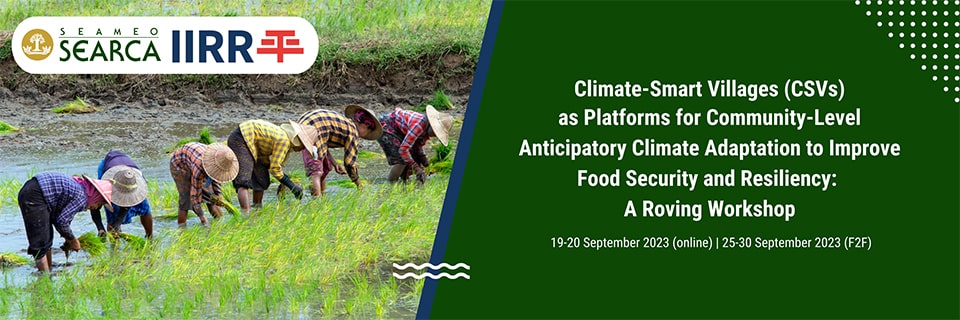
Contents
Course Description
This eight-day blended course is organized and implemented by the Southeast Asian Regional Center for Graduate Study and Research in Agriculture (SEARCA) and the International Institute of Rural Reconstruction (IIRR).
This course is designed for participants across Southeast Asia to visit communities and witness first-hand how food systems-sensitive climate change adaptation (CCA) platforms are established, sustained, and scaled at community levels. Specifically, the target participants of this course are:
- Members of the ASEAN Climate Resilience Network
- University professors/researchers
- Agricultural extension officers
- Representatives of farmer groups/cooperatives
- Private sector CSR/sustainability officers
- Other CCA practitioners and decision makers in the government or NGOs
This collaborative effort between SEARCA and IIRR aims to enhance the capabilities of the participants to promote, disseminate, and advocate for local platforms for scaling inclusive forms of climate-smart agriculture and anticipatory climate adaptation.
Course Objectives
- Enhance knowledge and understanding of the CSV approach as an adaptation platform for building community-level capacities to cope with climate change, foster equity, and address livelihood and food security priorities;
- Identify practical strategies and approaches for diversification and intensification to reduce the risks of smallholder farmers to extreme weather, rising temperatures, and variable weather;
- Understand the challenges and opportunities in CSA in different agroecosystems (coastal, lowland, and uplands);
- Identify and understand the social, institutional, technical, and policy considerations in programming for climate change adaptation in CSVs; and
- Formulate action plans reflecting the application of lessons learned and insights gained from the course.
Modules
| Module 1: | Understanding the Climate-Smart Village (CSV) Approach for Building Capacities to Cope with Climate Change and the Practice of Establishing CSVs |
| Module 2: | Strategies and Approaches to Reduce Climate Change Risks, Address Socio- Technical Challenges and Explore Adaptation Opportunities in Different Agroecosystems |
| Module 3: | Reflection and Synthesis Workshop (Agroecosystem Specific Applications and Lessons) |
| Module 4: | Action Planning |
If you wish to join only Module 1 (virtual sessions) on 19-20 September 2023, the course fee is USD 100 for international participants or PHP 4,500 for Filipino/local participants. Fill out the registration form for the virtual sessions to receive details on how to proceed with the payment.
Module 1 Sessions and Speakers
| Session 1 | |
| Participants' Sharing on Organizations' CCA Interventions and Lessons Learned | SEARCA/IIRR Facilitator |
| Session 2 | |
| Anticipatory Climate Change Adaptation: What Matters & How CSVs can be Managed to Serve as Platforms | Dr. Julian Gonsalves Senior Advisor, IIRR |
| Agrobiodiversity and Nutritious Climate Friendly Foods: The Food-Climate Connection | Dr. Danny Hunter Scientist, Alliance Biodiversity CIAT |
| Nature-based Solutions for Climate-Smart Agriculture | Dr. Dindo Campilan Regional Director for Asia & Hub Director for Oceania, International Union for Conservation of Nature (IUCN) Asia Regional Office, Bangkok |
| Session 3 | |
| Climate-Smart Villages: Key Concepts, Practices & Emerging Insights | Dr. Julian Gonsalves Senior Advisor, IIRR |
| Historical Evolution of the AMIA Village Approach: Institutionalization of AMIA Development Pathways | Dr. Alice Ilaga Director, CRAO Office, Department of Agriculture Philippines |
| Social Considerations & Participatory Approaches for CSA Portfolio Delivery | Ms. Magnolia "Maggie" Mosimo Operations Director, Philippine Program, IIRR |
| Local Food Systems: Why it Matters in a Changing Climate? | Dr. Jessica Fanzo Professor of Climate Director, Food for Humanity Initiative Interim Director, Int'l Research Institute for Climate & Society (IRI), The University of Columbia, New York |
Course Fee
For participants attending the whole program (both virtual and onsite sessions), the course fee of USD 2,000 covers the course materials, meals, accommodation, field visits, and airport transfers.
Available Grant
SEARCA will be offering limited and competitive grants for a subsidized course fee for nationals of SEAMEO Member Countries. Please indicate in your application if you wish to apply for a SEARCA grant. Below are the criteria for selection:
- Relevance of present position/role in relation to the course objectives;
- Proficiency in spoken and written English (all sessions will be conducted in English);
- With regular full-time appointment on active status (not on leave) or with a long-term contract as consultant/job order, as certified by the Head of Human Resource and Development of the sending institution/organization, and likely to serve the institution/organization for at least two more years;
- Clearly expressed willingness to participate actively in the full learning event, including support from the direct supervisor;
- Endorsed by the organization/institution head; and
- Has prepared a draft Re-Entry Action Plan (REAP).
How to Apply
Fill out the online application form through bit.ly/CSVCCA2023 and attach the following supporting documents:
- Application Form*
- Nomination Form*
- REAP Form*
- Statement of Commitment Form*
- Curriculum Vitae
- Bio page of your valid passport
The call for grant applications has closed. Successful applicants with partial or full grants will be notified soon. Meanwhile, registration for the virtual sessions is until 15 September 2023.
*Click the link to download the file